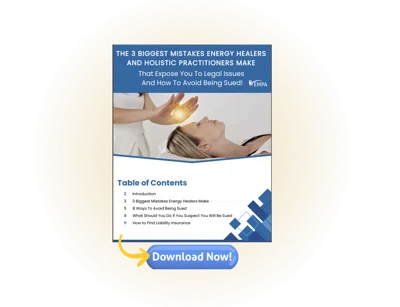Have You Crossed the Line? Scope of Practice for Energy Healers
October 14th, 2025
4 min read
By Anya Charles

How far is too far in energy healing? Where does insight end and risk begin?
Often, healers have a strong intuitive understanding during a session, or a deep knowing about what’s going on. Perhaps they feel a desire to offer more than their formal training technically allows.
These moments can feel powerful — even helpful — but they may also push a well-meaning energy healer beyond their professional limits.
In this article, you’ll get a practical self-assessment, 4 real-life examples of common scope issues, and clear ways to reframe what you say — so you can keep your sessions safe, ethical, and aligned with your training.
💡At EMPA, we’ve supported thousands of energy professionals in building safe, ethical, and confident practices. If you’re ready to avoid the most common pitfalls that put practitioners at risk, grab your free copy of The 3 Biggest Mistakes Energy Healers Make — and How to Avoid Them.
 What Is Scope of Practice in Energy Healing?
What Is Scope of Practice in Energy Healing?
Your scope of practice exists as a way to protect your healing work – and so much more. It defines the boundaries of your modality, outlining the “who, what, where, when, and how” of your professional role.
In practice, that means clarifying your credentials, experience, and methods, while setting clear expectations so clients know what you can and cannot provide. A strong SOP protects both practitioner and client by ensuring safe, transparent, and professional care.
For energy practitioners, an SOP can sometimes feel blurry, especially if your work is intuitive, subtle, body-based, or utilizes multiple modalities.
On top of that, it’s important to know that each state has different laws, and some modalities might be more tightly regulated than others. That’s why it's so important to understand your scope — not just legally, but ethically too.
 How Do I Know If I’ve Crossed a Line?
How Do I Know If I’ve Crossed a Line?
Most energy practitioners who step outside of their scope do so by accident; not purpose, but rather out of concern or care.
It might start with a strong impression or a client asking for clarity. It can feel like helping — but if it goes beyond your training or hints at a medical result, you may have crossed the line.
💡Think you’re safe because you didn’t “do” anything wrong? Think again. Can You Really Be Sued for Something You Didn’t Do? Here’s How to Prepare
 3 Self-Reflection Questions to Tell If You’ve Stepped Outside Your Scope:
3 Self-Reflection Questions to Tell If You’ve Stepped Outside Your Scope:
- Did I just step outside my training? If you offered advice, used a modality you weren’t trained or certified in, or made a recommendation that goes beyond your formal knowledge —that’s likely a red flag.
- Did I imply a medical outcome? If you are a non-licensed practitioner and found yourself saying something like this will cure your back pain or you don’t need that medication anymore, you may have crossed the line — even if your intention was well-meaning. Statements like this may be interpreted as medical claims and could expose you to liability.
- Do I feel nervous about writing down what just happened? That’s your intuition sounding an alarm. If you wouldn’t be comfortable documenting it in your session notes, it may have gone beyond what’s appropriate for your role.
An SOP is about staying aligned with your training, your insurance coverage, and the laws that apply in your area.
If you feel that tug to say more, consider a quick assessment:
- Is this grounded in my training?
- Would I feel confident documenting this?
- Is this within my legal role as a practitioner?
- Am I making the ethical choice?
If the answer is “maybe not” — that’s your sign to pause, reframe, or refer.
💡Using your intuition? There’s a right way to share it. The Risk of Saying Too Much: How to Use Intuition Responsibly in Energy Healing
 4 Common Scope of Practice Mistakes Energy Healers May Make
4 Common Scope of Practice Mistakes Energy Healers May Make
It’s one thing to understand the concept of scope. But it’s another to recognize what it might look like in practice.
The following are illustrative examples of common situations healers encounter, along with possible ways a practitioner might respond that stay closer to their professional boundaries. (These are educational teaching examples only - not scripts or guarantees!)
![]() Scenario 1: A client casually asks, “What do you think is wrong with me?”
Scenario 1: A client casually asks, “What do you think is wrong with me?”
- Temptation: To answer directly in order to show support.
- Safer principle: A cautious practitioner might reflect what they notice without diagnosing. For instance, reflecting energetic observations - like where energy may feel concentrated or blocked - and suggesting a client see their medical provider with health questions.
![]() Scenario 2: You’re trained in Reiki and recently saw a demonstration of a new hands-on technique at a retreat. During your next session, your client asks if you can try it with them.
Scenario 2: You’re trained in Reiki and recently saw a demonstration of a new hands-on technique at a retreat. During your next session, your client asks if you can try it with them.
- Temptation: To experiment or improvise.
- Safer principle: A conservative approach is to stick with modalities you’re formally trained and insured to practice. Practitioners often find it helps to be transparent with clients about the limits of their training and when new skills will be incorporated.
![]() Scenario 3: A client mentions they’re on medication and asks if they should keep taking it.
Scenario 3: A client mentions they’re on medication and asks if they should keep taking it.
- Temptation: To give advice based on intuition or personal belief.
- Safer principle: Scope-aligned responses keep medical decisions in the hands of the prescribing provider. Practitioners can emphasize their role as complementary support rather than substituting for professional medical guidance.
![]() Scenario 4: You’re wrapping up a session and say something like, “This should take care of the issue.”
Scenario 4: You’re wrapping up a session and say something like, “This should take care of the issue.”
- Temptation: To reassure the client with a promise of results.
- Safer principle: Instead of predicting outcomes, a prudent practitioner focuses on observation and client awareness, for instance, inviting clients to notice how their body integrates the session, while keeping space for follow-up if questions arise.
These aren’t about saying less. Instead, what you’re doing is saying what’s appropriate, clear, and true to your scope.
 What’s Next: Confidence in Boundaries
What’s Next: Confidence in Boundaries
We hope this article helps you start recognizing the edge of your scope — so you feel more confident when you’re working within your range, and aware of when you might be stepping out of it. Professionalism doesn’t have to mean cutting off your intuition; it means finding ways to share it responsibly!
As you move forward, may clarity become your anchor. When something feels fuzzy, having tools like informed consent with a scope of practice, and referral language can help you pause, reflect, and protect both your client and yourself.
Want to avoid the most common legal and ethical mistakes energy healers make? Download your free guide The 3 Biggest Mistakes Energy Healers Make — and How to Avoid Them. These simple shifts could protect your practice — and your peace of mind.
Disclaimer: This article is for educational purposes only and does not provide legal, financial, or medical advice. The examples are general, and coverage may vary by policy. Always refer to your insurance provider or policy language for specific details, as the policy terms take precedence. For legal concerns related to your practice, consult an attorney.
Anya is a writer with a passion for inspiring those around her. She is the Content Manager at EMPA, where she works closely with subject matter experts to turn their insight into articles that inform, support, and empower the energy healing community. With over a decade of experience in the wellness world, she enjoys making complex ideas feel accessible and meaningful. Whether she’s writing new pieces or polishing others, Anya’s focus is on helping others grow their clarity and professionalism. She also serves as Editor in Chief of Energy Magazine, a unique publication dedicated to the world of energy medicine. Outside the office, you’ll find Anya reading, planning travel adventures, or negotiating peace treaties with her houseplants.
Topics:

.png?width=1326&height=405&name=EMPALogo_final_white-01%20(1).png)


























